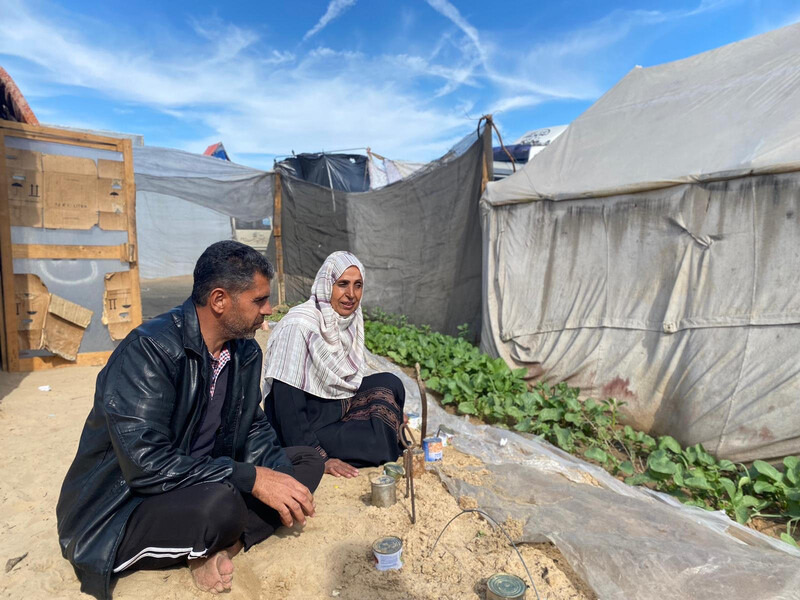The Electronic Intifada 18 November 2024

Never give up: Luay and Najah show off the small strip of cultivated land near their Rafah shelter.
Amid the wholesale destruction of the Gaza Strip, two siblings have managed to not only hold on to their own passions, they’ve found hope and purpose despite the desolation.
Luay, 46, and Najah, 59, from the Khudeir family are both farmers.
Both were forced to flee their homes in Beit Lahiya in the very north of Gaza during the first week of Israel’s genocidal onslaught last October.
They have now been displaced four times with their families – each has six children. Their journey has taken them from the very north to the very south in Gaza, and now to the middle, yet their connection to the land has remained unbroken.
The idea to return to cultivating the land blossomed in Najah’s mind while she was foraging for firewood in Rafah at a time when there was a severe shortage of cooking gas in the area.
She stumbled upon some wild garlic and decided to bring it back to Luay.
“Why should we stop farming?” Najah recalled asking. “Let’s grow even in these circumstances.”
Before Israel’s genocidal aggression started, the siblings farmed 55,000 square meters of land, divided mostly into a commercial strawberry operation and cucumbers, but which also produced potatoes, onions and leafy vegetables, Najah said.
The “love for greenery” is “ingrained” in the siblings’ blood, Luay said, as it is for many other residents of Beit Lahiya.
So it was an easy decision for Najah and Luay to begin to cultivate the land around their shelter despite the many challenges and the relentless Israeli attacks that have claimed the lives of others who tried the same.
Initially, they encountered skepticism.
“Some family members told me that I wouldn’t spend the rest of my life in displacement, so why farm?” Najah recalled. “But I feel safe when my surroundings are green, even if I am far from my home and land.”
Pure resilience
Using seeds they’d brought with them from their own land, Najah and Luay planted radishes, wild garlic, Swiss chard, molokhia, beans, tomatoes, basil, mint and thyme.
Najah likes to recite a prayer whenever she says down a seed, she said, asking God to “feed us and the birds.”
With water scarce, they reused what water they used for washing to nourish their plants.
“We reuse water to irrigate the plants instead of letting it collect in pits and turn into sewage,” Luay said.
Eventually the siblings’ efforts bore fruit – literally.
During Ramadan this year, which ran from February to March, their crops thrived just as vegetable prices in the market spiked as a result of widespread scarcity.
Luay and Najah were not growing to sell, but they had grown enough to sustain themselves, other relatives and those around them.
“I distributed vegetables to relatives and neighbors, and they were happy, now saying that the idea of farming was indeed a good one,” Luay, who also works as a handyman to bring in some income, recalled.
But the siblings faced new challenges when they were displaced for a fourth time as Israel’s ground invasion on Rafah in May launched.
This forced them to Khan Younis, where they set up their tents in an area filled with mostly sandy land.
But even this terrain did not stop them. They did what they had done in Rafah, laid down seeds near them with prayer and watched as their efforts bore fruit again.
“Here I am today, eating and feeding those around me from my plants because the markets are empty due to the closure of the crossings,” Najah said.
They are fully aware of the destruction that has been wrought across Gaza, and that has been wrought on their own land in Beit Lahiya, where they know from the few neighbors who have clung to life there that their land has been razed.
But, Najah said, they refuse to abandon their connection to the land.
“When I sit in front of my plants, I feel a renewal of spirit. I teach my children that life continues despite all the challenges we face.”
Rajaa Salah is a content writer based in Gaza.





